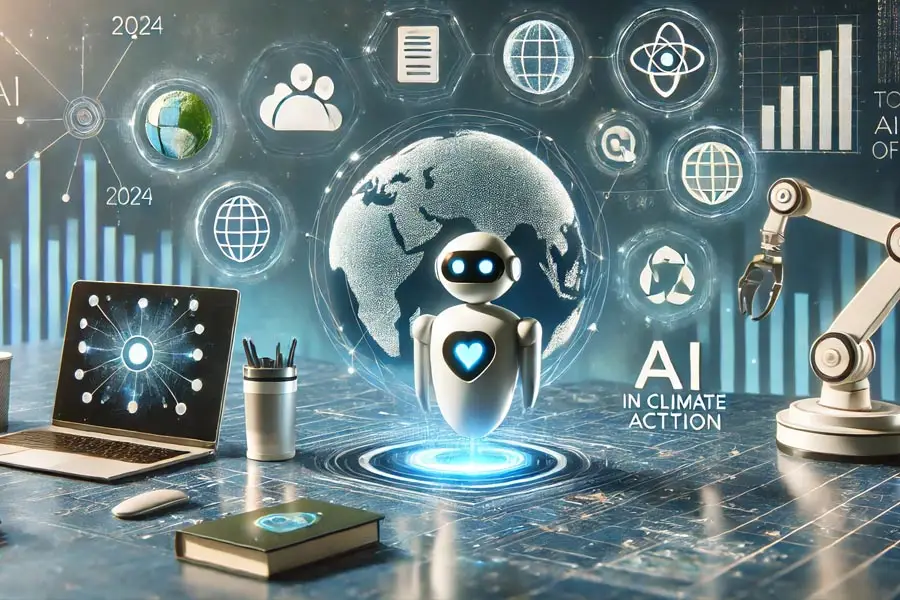Rapid advancements in artificial intelligence (AI) are changing businesses, increasing efficiency, and altering how humans use technology. A number of new trends are expected to have a significant influence on society and industry as 2024 approaches. These are the most important AI topics to keep an eye on in the upcoming years, along with how they will probably affect our future.
1. Generative AI Goes Mainstream
With breakthroughs like ChatGPT and DALL-E, generative AI—models that can produce original text, audio, video, and image content—has garnered significant attention. The use of generative AI technologies in customer service, content production, and creative industries will continue to grow in 2024. Generative AI is already being used by businesses to generate code, automate design processes, and create marketing copy. We may anticipate that the creative industries will use AI to produce more individualized and rapid content as models get more complex.
2. AI-Powered Automation in the Workplace
AI is automating complicated procedures and cognitive functions, so automation is no longer just found on manufacturing floors. AI is being utilized to manage administrative duties, process transactions, and automate customer support in industries including retail, healthcare, and banking. Even more common will be tools that make everyday decision-making, report preparation, and data entry easier. AI-driven automation is predicted to be implemented by more companies by 2024 in an effort to increase productivity and free up staff members to concentrate on strategic, creative, or interpersonal tasks.
3. Enhanced AI-Powered Personalization
Although customization has always been important, it is getting much more accurate thanks to developments in machine learning. AI in retail can make product recommendations based on a customer’s browsing and past purchases. AI is used by streaming services in the entertainment industry to present material according to user preferences and viewing patterns. User experiences will become more customized than ever before as personalization becomes more accurate and seamless.
4. AI Ethics and Governance
Ethical issues including prejudice, accountability, transparency, and data privacy are coming into sharper focus as AI becomes more integrated into daily life. As a result, there will be a stronger push for ethical AI governance and regulation in 2024. To control risk and guarantee fair practices, many businesses are establishing AI ethics boards, carrying out bias audits, and putting transparency frameworks into place. To protect user rights and guarantee that AI is developed responsibly, governments and international organizations are also creating rules and regulations.
5. Generative Design in Manufacturing and Product Development
AI algorithms are used in generative design to provide optimal designs for components, structures, and products. AI assists engineers and designers in identifying the most practical, effective solutions by modeling many design iterations. By using less material and producing less waste, this trend in manufacturing enables businesses to create products that are stronger, lighter, and more environmentally friendly. By 2024, generative design will be employed more and more in the consumer goods, automotive, and aerospace industries to produce inventive and eco-friendly products.
6. Explainable and Transparent AI
The need for transparent and explainable systems is increasing as AI models get more complicated. Because some AI algorithms are “black box,” it may be challenging for people to comprehend how decisions are made. Explainable AI will be given more attention in 2024, especially in high-stakes industries like criminal justice, healthcare, and finance. In addition to helping businesses adhere to legal requirements, explainable AI builds user trust so that people can comprehend and accept AI-driven judgments.
7. AI in Climate Action and Sustainability
AI is being used more and more to solve environmental issues, from anticipating climate patterns to helping conserve biodiversity to optimizing energy use. Large-scale datasets from climate sensors, weather models, and satellite photos can be analyzed by AI algorithms to offer insights for environmental conservation initiatives. AI will play a key role in climate research, energy efficiency, and sustainability projects in the years to come, assisting corporations and governments in making data-driven decisions to lessen their negative effects on the environment.
8. Advances in Natural Language Processing (NLP)
Recent years have seen a considerable evolution in natural language processing (NLP), with models such as ChatGPT establishing new benchmarks for the creation of language that is human-like. NLP will keep developing in 2024, which will help companies automate customer support, enable voice-activated instructions, and improve text analysis. NLP applications will become more precise, sophisticated, and responsive with better language models, increasing the range of possible use cases in fields like legal, medical documentation, and customer service.
9. AI for Cybersecurity
The sophistication of cybersecurity attacks is rising, and artificial intelligence (AI) is essential to detecting and reducing these threats. Real-time protection of sensitive data, detection of anomalous activity, and flagging of possible security breaches are all possible with machine learning algorithms. More businesses will be implementing AI-powered cybersecurity solutions in 2024, which can enhance overall resilience and proactively guard against cyberthreats. Security teams will be able to stay one step ahead of bad actors thanks to AI’s rapid analysis of massive databases.
10. Quantum Computing and AI Synergy
By facilitating quicker processing speeds and managing intricate computations that traditional computers find difficult to complete, quantum computing has enormous promise to advance artificial intelligence. Even though quantum computing is still in its infancy, it is anticipated to have a big influence on AI research and development in the years to come. The combination of AI and quantum computing will be especially useful in domains like drug development, materials science, and encryption that demand a lot of processing capacity. This tendency will create new opportunities for the development and use of AI.
Conclusion
Artificial intelligence developments will keep pushing the envelope as we enter 2024 and beyond, changing industries and the way we live and work. AI will become much more crucial in fostering innovation, from ethical issues to developments in cybersecurity, automation, and personalization. Businesses, legislators, and individuals alike must keep up with these developments as we all work to negotiate the benefits and difficulties presented by AI’s quick development.

